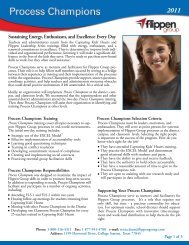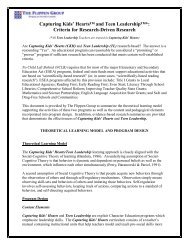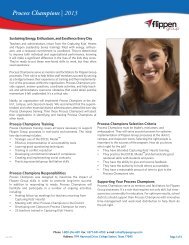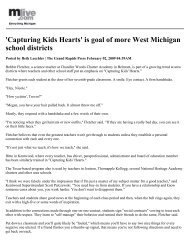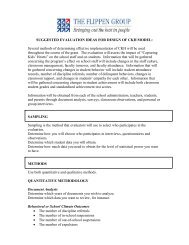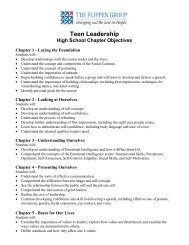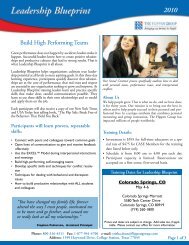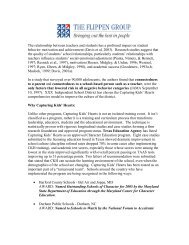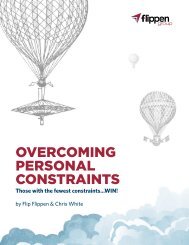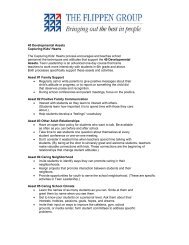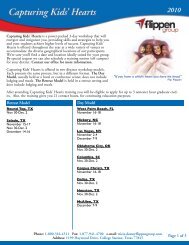Smart & Good High Schools - The Flippen Group
Smart & Good High Schools - The Flippen Group
Smart & Good High Schools - The Flippen Group
- No tags were found...
You also want an ePaper? Increase the reach of your titles
YUMPU automatically turns print PDFs into web optimized ePapers that Google loves.
CHAPTER 5: Fostering the 8 Strengths of Character—Outcome 6A 4-Year Advisory ProgramWe visited an award-winning high school whose advisoryprogram spanned all four years. This school’s advisories:◆ are aimed at helping students set short and long-termeducational goals and develop a healthy self-conceptand positive life skills◆ each have 25 students, a mix of all four grade levels◆ meet once a week for 45 minutes◆ include a faculty supervisor but are led by seniors◆ every year focus on a different theme, chosen by thestudents◆ are continually modified on the basis of studentresponses to an end-of-the-year survey that asks, “Whatdid you most like about advisory this year?” “What suggestionsdo you have that would make advisory aworthwhile program for you?”A school counselor explained how advisory members takeresponsibility for researching topics and teaching theirpeers:We typically divide the yearly theme into five subtopics andeach advisory into groups of five students. Each group offive takes a different subtopic— such as eating disorders,sexual assault, alcohol abuse, or drug dependency—andmakes a short video on that issue, interviewing students,parents, teachers, alums, and often community professionals.Along with the video, they create an informational brochureon their topic that is distributed to students and staff. Eachgroup then presents its video and brochure to its advisoryand leads the discussion of that issue.“We also do a lot with personal survivor stories,” the counselorsaid. “<strong>The</strong>se are personal testimonies, often writtenby former students, dealing with a range of topics such assexual assault, domestic violence, drug and alcohol problems,and friendship issues.” (For an example, see thebox below.)One purpose of the survivor stories is to foster a strongsense of collective responsibility, including the belief thata true friend doesn’t just stand by and watch while someoneshe or he cares about makes destructive decisions.This is a character theme that advisories would do well toemphasize. In an ethical learning community, valuing self-As a little girl, I had seen the pain of living with analcoholic parent, but in high school I told myself Icould handle drugs. Though I denied it, I was walkingdown the same path as my father, whom I had despisedfor so long. As I got deeper into drugs, I was losing mybest friend, and I was losing myself. I was lying constantlyand putting my friends in terrible positions by askingthem to lie for me.I was fortunate to have a friend who cared enough aboutme to do the one thing that no one else cared enough todo. She got me help. It takes tremendous strength to disregardthe repercussions of telling on a friend, especially ifit means you might lose that friendship in the process.When my counselor and best friend confronted me, I wasshocked, then scared, then livid. I felt hurt and betrayed.Eventually I felt relieved that I had been pushed into aposition where I couldn’t lie anymore.Even though I was relieved, however, I wouldn’t talk tomy friend for months. But she never stopped approachingme, never stopped asking me how I was doing even if Iignored her. <strong>The</strong> people I had partied with just disappeared.Finally, I gained enough inner strength to realize whatWHAT ARE A FRIEND’S RESPONSIBILITIES?she had done for me. I am so thankful I had a friend whobelieved in me—not the party girl—and did not take theeasy way out. She loved me. She cared enough to save mewhen I couldn’t save myself. Real friends won’t let youjeopardize your life. Real friends will be honest with you.I finally gained the strength to have a real friendship. Ihope that someday I can give to another person whatCarolyn gave to me.Questions for writing and discussion:1. What are your reactions to this story?—AN ALUM2. What are our responsibilities when we see a friendstruggling with alcohol, drugs, an eating disorder, orsome other self-destructive behavior?3. What would you be willing to do for a friend in need?What are the difficulties in trying to help a friend orfamily member in this kind of situation?4. If you knew a friend was struggling with alcohol, drugs,or some other serious problem, how would youapproach them?163<strong>Smart</strong> & <strong>Good</strong> <strong>High</strong> <strong>Schools</strong>



